Popular on Food52
90 Comments
DMC
August 26, 2015
Instead of alum you are suggesting four to five black tea bags in one quart boiling water, correct? How long do you steep the tea before adding to the jars? (I assume the tea bags do not go in the jars.). Please describe this alternate process in more detail. I am also concerned about using alum. Thank you!
Patti F.
July 4, 2015
Can't wait to try! Cucumbers should be coming in by end of month.
It would be great if someone could develop a similar recipe for crunchy dill pickles too! :D
It would be great if someone could develop a similar recipe for crunchy dill pickles too! :D
jthelwell
July 26, 2014
Started these yesterday. I don't have alum handy (and I don't want to get into a discussion about whether to use it or not) and I will need to use black tea or bay leaves. Any guidance on how much of those items I should use?
MrsWheelbarrow
July 26, 2014
I tested the recipe with many different crisping agents for my book. Use four or five black tea bags (I used Lipton's). I've never heard of using bay leaves for this purpose!
jthelwell
July 28, 2014
Ah, well, I used 2 tea bags based on something I found on another site. We'll see how this comes out.
Diane
July 24, 2014
I too would not use alum. Though small quantities are "tolerated," why risk it?
I heard about something called "pickle crisp" which is calcium chloride - a salt. The FDA says many additives are "safe" but school isn't out yet on all these additives. We certainly have our share of illnesses that seem to come from "living longer." I think it could be because we are exposed longer. The recipe and the text for Seven Day Pickles is well appreciated; I will try it with a substitute for Alum. (Once, when Aluminum was first being investigated as being bad for your health, I threw out ALL of my beloved pots and pans from my grandparents. They all used aluminum pots and pans to cook with. Stainless steel or cast iron for me. Tossing those pots wasn't easy; so seeing the word alum kind of got my hackles up.)
Thanks
dsl
I heard about something called "pickle crisp" which is calcium chloride - a salt. The FDA says many additives are "safe" but school isn't out yet on all these additives. We certainly have our share of illnesses that seem to come from "living longer." I think it could be because we are exposed longer. The recipe and the text for Seven Day Pickles is well appreciated; I will try it with a substitute for Alum. (Once, when Aluminum was first being investigated as being bad for your health, I threw out ALL of my beloved pots and pans from my grandparents. They all used aluminum pots and pans to cook with. Stainless steel or cast iron for me. Tossing those pots wasn't easy; so seeing the word alum kind of got my hackles up.)
Thanks
dsl
I_Fortuna
July 13, 2014
There is a much healthier way to make pickles than adding alum (hydrated potassium aluminum sulfate). I would rather not ingest aluminum. I make my pickles in a Japanese pickle press and use only salt to make them. It takes less than an hour. I pour off the brine, rinse with fresh water, add a little vinegar optional spices and refrigerate. Ridding the cucumbers of excess water is the secret to making them crispy.
MrsWheelbarrow
July 13, 2014
This is a very different type of pickle. I love a good lacto fermented pickle, but these are brined with vinegar instead. If alum worries you, try black tea leaves, grape leaves or oak leaves instead.
I_Fortuna
July 14, 2014
Thanks for the tip on grape and oak leaves. I believe fig leaves work well also from our fig tree. Black tea leaves I don't use because of the oxalic acid. Calcium binds to oxalic acid and can cause kidney stones. Lacto fermented pickles are great but enough salt needs to be added to make them crispy otherwise they come out soft with no snap or crunch. For me, it works best to salt and press the cucumbers to remove the excess water making them much more crunchy. I then rinse well with fresh water, put them in jar with vinegar. water and spices and refrigerate. They don't last long enough to ferment them on the counter. LOL I save that for other shredded veggies using a jar with an airlock. Keeping out the air as much as possible ensure that the good cultures take over not allowing the bad cultures to become prolific.
I make my own kefir and yogurt as well so we get plenty of probiotics. By the way, kefir has about three times the probiotics of yogurt and is easier to make for those interested. No heat or special appliance is needed for kefir.
I make my own kefir and yogurt as well so we get plenty of probiotics. By the way, kefir has about three times the probiotics of yogurt and is easier to make for those interested. No heat or special appliance is needed for kefir.
Pam B.
July 3, 2014
Oh good. Thanks for your quick reply!! Looking forward to these pickles. I had some yellow squash pickles the other day and they were delicious; ever make those?
Pam B.
July 3, 2014
Does it take awhile for the pickles to get real sweet? I'm on day 7 & just packed them in my jars; I had a taste of course, they were real tart.
MrsWheelbarrow
July 3, 2014
They will sweeten and mellow over the next week or so, but if they aren't sweet enough for you, unpack the jars and add another 1/2-1 cup of sugar, then repack.
Tricia
June 27, 2014
I'm not sure if what i planted are kirby cucumbers, nor not. I know i have some pickling cucumbers. Do you think they would turn out if i use another type of cucumber? Also is there a link for the sour pickles? The link to the NYTimes in a previous comment is not valid. Thank you.
MrsWheelbarrow
June 28, 2014
Hi Tricia, If the packet said pickling cucumbers, you are in luck! Definitely do not use the salad cukes, the kind you find in the grocery store. This recipe requires a pickling cucumber. Here's the link for the sour pickles: http://www.nytimes.com/recipes/1014867/sour-pickles.html
Marlene
August 20, 2013
If I am using two quart sized jars, do I double the amounts of... salt, alum, pickling spice, etc? and water?
MrsWheelbarrow
August 20, 2013
The recipe is scaled for two quarts or one half gallon, so the amounts of alum, salt, etc are all appropriate as written. Have fun and enjoy the pickles!
Marlene
August 16, 2013
Do I refrigerate these at any time during the process? I'm at day four and was wondering...
Marlene
August 14, 2013
After the first day the water was cloudy and had a slimy little slick on top. Is this ok? I'm at day two and the pickles are floating. Will they sink? I'm worried about the few on top exposed to air.
MrsWheelbarrow
August 14, 2013
Yes, it gets cloudy - that's fermentation! Don't forget, the liquid is replaced every day. If pickles are floating, place a plate, saucer, bowl or whatever on top to force the floating ones under the liquid.
Marlene
August 14, 2013
Thanks! I can't wait until they are ready to eat. This is my first attempt a pickles.
:-)
:-)
chelsabea
August 11, 2013
Made these this week and they are amazing! My husband and I both love them.
Stacy B.
August 8, 2013
Mrs Wheelbarrow, My pickles looks a lot like the picture shown on this page. I think the pickling spices (cloves, allspice) and the black tea leaves may impart a little color, but it isn't noticeable.
cindy
August 8, 2013
Thank you for the quick response. I will try a half batch of the slices and a half batch of the spears. With fingers crossed.:)
cindy
August 8, 2013
Hello, this looks like the perfect recipe for me. Wondering if I can quarter slice(like spears)instead of medallions?
MrsWheelbarrow
August 8, 2013
Hi Cindy, this recipe is geared for chunky slices, not spears. I can't promise the same results if you change the shape.
Stacy B.
August 6, 2013
Also, I used black tea leaves in place of alum to keep the pickles crispy, and it worked beautifully. They contain tannin.
MrsWheelbarrow
August 8, 2013
Stacy, that's a very cool idea. Did the tea leaves dye the pickles a darker color?
Stacy B.
August 6, 2013
Will the lacto bacteria be alive throughout this process? I love sweet pickles and healthy gut flora both!
I_Fortuna
July 13, 2014
Cucumbers and cabbage both have the wild cultures that help with the lacto- fermentation. Also, if you like them with a snap use more salt. This makes them a lot crispier. Vinegar fights the action of the salt. One is acidic and the other alkaline. More salt=crispier pickle. Personally I avoid foods with sugar and excess carbs. By the way. I don't care about the myth, it cannot be healthy to ingest aluminum on purpose, there is enough in food and the environment for the body to rid itself of.
"Oral exposure to aluminum is usually not harmful. Some studies show that people exposed to high levels of aluminum may develop Alzheimer’s disease, but other studies have not found this to be true. We do not know for certain that aluminum causes Alzheimer’s disease.
Some people who have kidney disease store a lot of aluminum in their bodies. The kidney disease causes less aluminum to be removed from the body in the urine. Sometimes, these people developed bone or brain diseases that doctors think were caused by the excess aluminum.
Although aluminum-containing over the counter oral products are considered safe in healthy individuals at recommended doses, some adverse effects have been observed following long-term use in some individuals."
http://www.atsdr.cdc.gov/phs/phs.asp?id=1
"Oral exposure to aluminum is usually not harmful. Some studies show that people exposed to high levels of aluminum may develop Alzheimer’s disease, but other studies have not found this to be true. We do not know for certain that aluminum causes Alzheimer’s disease.
Some people who have kidney disease store a lot of aluminum in their bodies. The kidney disease causes less aluminum to be removed from the body in the urine. Sometimes, these people developed bone or brain diseases that doctors think were caused by the excess aluminum.
Although aluminum-containing over the counter oral products are considered safe in healthy individuals at recommended doses, some adverse effects have been observed following long-term use in some individuals."
http://www.atsdr.cdc.gov/phs/phs.asp?id=1
Richard G.
August 1, 2013
I am at day 7 and the sweet pickles are now divided into 4 pint jars. Question: they are less than half full with liquid. I will turn them for the next few days, but is this correct? I'm wondering how they'll keep if half are in the liquid and half not. I've saved ll the vinegar/spice solution from days 4 to 7 so please let me know if I should add some to my pints. Thanks!
MrsWheelbarrow
August 1, 2013
Hi Richard, The syrup continues to form over the next few days as the sugar pulls from the pickles. If it is very low, make a simple syrup of equal parts of the vinegar solution and sugar, boil it for a few minutes and top off the jars.
deb O.
August 1, 2013
The pickles should be completely covered in the liquid! They continue to absorb flavor in the jar! :)
Richard G.
August 1, 2013
But were yours completely covered when you first put them in pints? With only 1/2 cup of vinegar reserved mine are not full. Or perhaps I was supposed to use all of the vinegar EXCEPT for 1/2 cup?
MrsWheelbarrow
August 1, 2013
Yes, they should be completely covered. Did you let them sit for awhile before packing the jars?
Richard G.
August 1, 2013
Yes, I let them sit for an hour after sprinkling 1 cup sugar and adding back 1/2 cup vinegar solution. That's the right amount of vinegar, right? If so, I'll give it a few days and see how much liquid is drawn out of the pickles. We should all be asleep!
deb O.
August 2, 2013
I was asleep! Having seen this type of pickle before, the uncovered ones can get sort of dried out- I wouldn't think after a couple days that it will be a problem anymore. I have to make these now! :)
emily
August 18, 2013
I followed recipe exactly and had same problem. I let them sit for a week and finally boiled more sugar/vinegar and poured over to cover. 1/2 cup liquid for four pints just seems so little!
Richard G.
August 18, 2013
Emily -- I ended up doing the same and the pickles have been a big hit -- about to run out. Still not sure about the liquid quantity but it was easily fixable.
MrsWheelbarrow
August 18, 2013
So interesting you've had this issue... I never have. I don't know if I pack them tighter? Or actually leave more liquid on them? HMM I have to make another batch to see.
Richard G.
August 18, 2013
More tightly packed -- I think that's it! I just reviewed the recipe and think I found my error. Since the pickles were in a half gallon jar for their seven-day journey, I had it in my head to spread them across four pint jars. But I just noticed that you indicate a yield of only three pints. That probably explains my shortage of liquid to cover. I saved all the liquid on day 7 so I imagine mine tasted the same -- delicious -- but have just had more room to swim around. Mystery solved, I think.
Tim G.
August 1, 2013
Alum is shorthand for potassium aluminum sulfate, and although it is a natural mineral, so are mercury and plutonium. Just say "NO!" to aluminum consumption in all forms, and maybe you'll dodge Alzheimer's disease, too, since aluminum buildup is found in the brain plaques of Alzheimer's victims. Cause, or effect? Do YOU want to find out the hard way?! I don't!
Stacy B.
July 3, 2014
It is true that Aluminum was once thought to be a possible suspect in Alzheimer's disease, but abundant research has since indicated otherwise. Nonetheless, you can use black tea leaves to replace the alum if you prefer.
http://www.alz.org/alzheimers_disease_myths_about_alzheimers.asp
http://www.alz.org/alzheimers_disease_myths_about_alzheimers.asp
Kate L.
July 22, 2013
Hello-
Thanks for this recipe as we have had a bumper crop of cukes this year. I had a question however exactly what 'cover' the jar means. Loosely cover? Tightly cover? Seal? I tightly covered the first day but when I opened the jar it nearly exploded in my face. For the following days (I am on day 4 today), I have used a jar without the rubber ring so that the pressure doesn't build up. They seem to be processing OK but when I drain them, they don't smell very good. Is this normal? Will the smell change when I add the vinegar today?
I hope that I don't have to throw the whole batch away seeing as I did make 10 pounds. I just don't want to make something that could be potentially toxic and/or dangerous.
Please clarify on what exactly is meant by 'cover the jar'.
Thanks so much and I look forward to hearing from you!
Kate
Thanks for this recipe as we have had a bumper crop of cukes this year. I had a question however exactly what 'cover' the jar means. Loosely cover? Tightly cover? Seal? I tightly covered the first day but when I opened the jar it nearly exploded in my face. For the following days (I am on day 4 today), I have used a jar without the rubber ring so that the pressure doesn't build up. They seem to be processing OK but when I drain them, they don't smell very good. Is this normal? Will the smell change when I add the vinegar today?
I hope that I don't have to throw the whole batch away seeing as I did make 10 pounds. I just don't want to make something that could be potentially toxic and/or dangerous.
Please clarify on what exactly is meant by 'cover the jar'.
Thanks so much and I look forward to hearing from you!
Kate
Cathy B.
July 22, 2013
Hi Kate, they do smell funky and fermented until the vinegar goes in the jar. That first day the pickles really ferment and can build up some gases. I have always covered the jar with a tight cover that clamps on. There is nothing toxic there. You've got a big batch of fermented pickles that are going to be delicious in a few more days.
Kate L.
July 22, 2013
Thanks for the response- I will move forward then with the rubber ring back on the jar to seal it up. I do think that you should clarify that in the recipe- the first day I was planning on just covering it with a cloth. I assume that would have messed up the fermentation? Must the gasses stay in the jar? Sorry for the confusion- just want to do it right! Thanks again for the quick answer and all of your great recipes! Kate
Kate L.
July 22, 2013
Sorry- just one more thing- below you say that there is LOTS of salt, but it doesn't seem like there is very much added (1 tablespoon above - 1/4 cup for a gallon of water in the recipe). Is that correct? Tasting the pickles at the moment I can't detect that much of a salty flavor. Thanks for your patience with my questions! Kate
MrsWheelbarrow
July 22, 2013
Kate, I think you could cover it with a cloth, cheesecloth or a cap, it will not make a difference in the end product. Keeping the gases in or letting them go will make no difference. These are very forgiving pickles (as long as you remove the blossom end of the cucumber. And for me, it's plenty of salt, but doesn't make a salty pickle, it's just enough to aid the lacto fermentation that starts the process. They definitely don't taste salty when they are done, they taste very sweet.
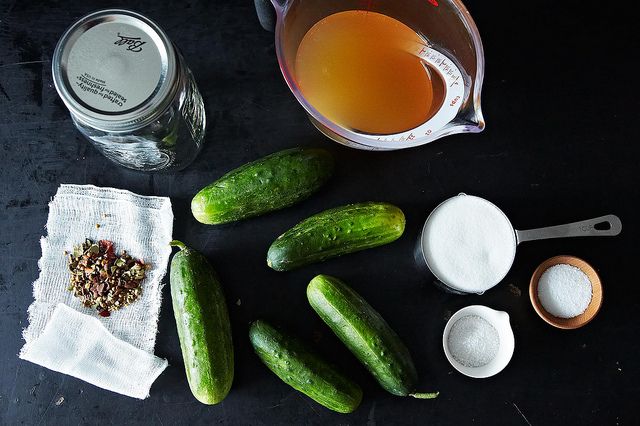
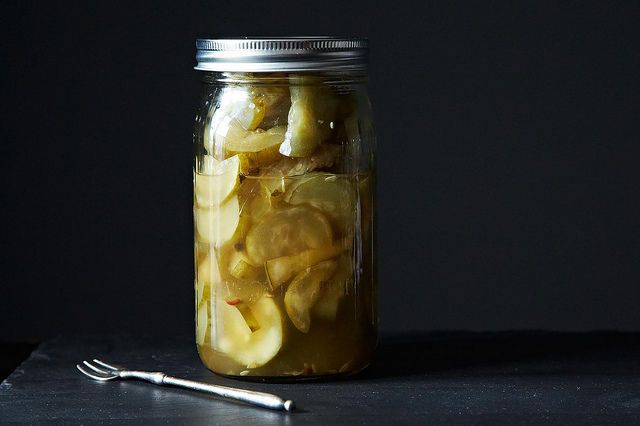
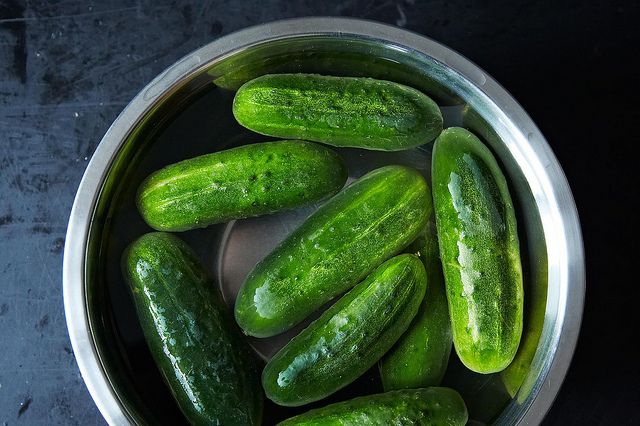
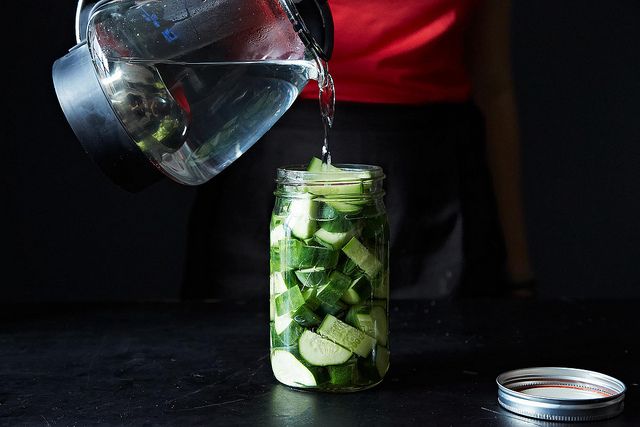
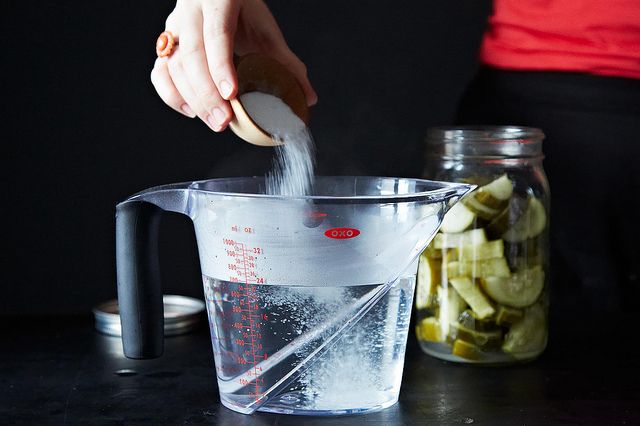
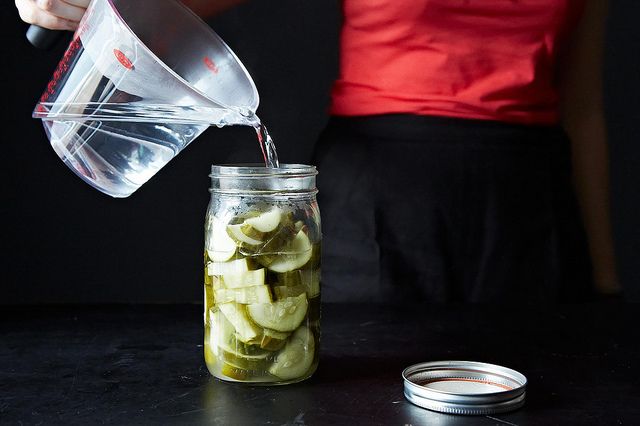
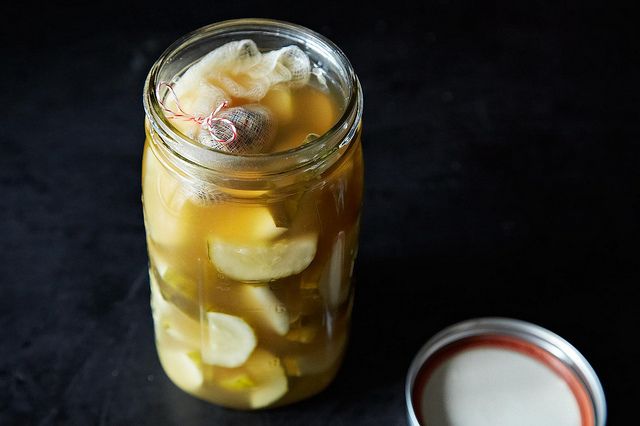
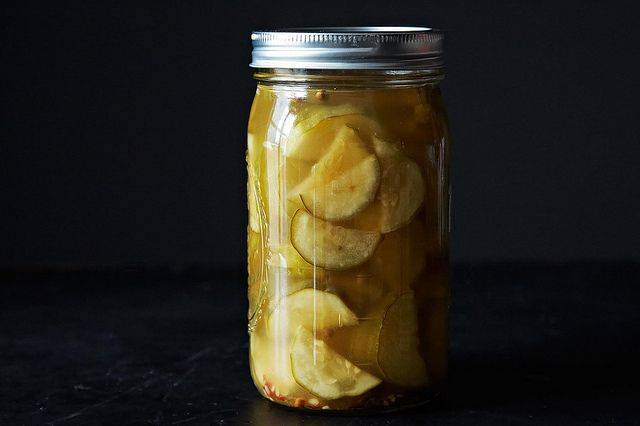
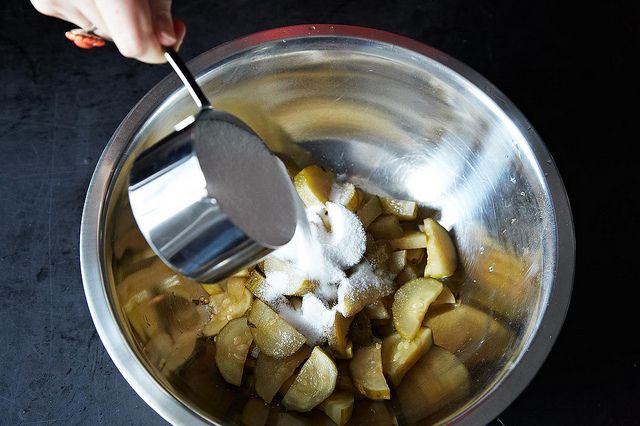
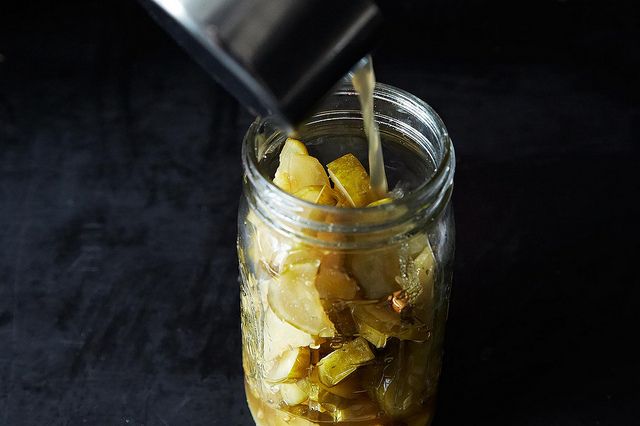
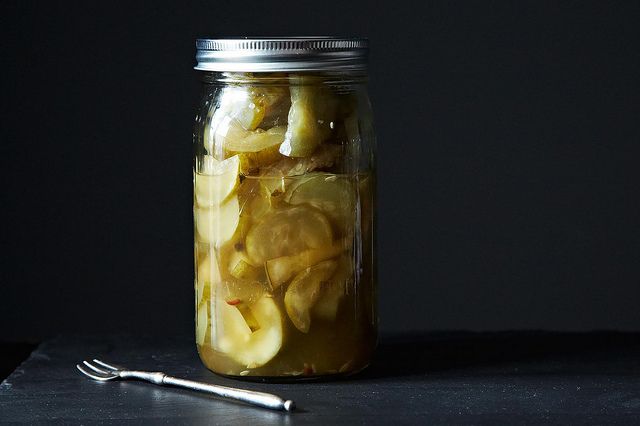

See what other Food52 readers are saying.